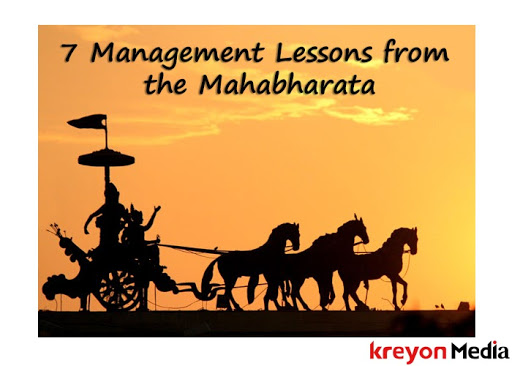
The Mahabharata is an ancient epic of ancient India. The stories from Mahabharata are interwoven into the culture and ethos of people from India. Mahabharata deals with all aspects of management, it draws insights from complex human behaviour and psychology from all walks of life. The management lessons from the Mahabharata can be applied in any context of modern life with incredible success.
Here’s a look at some of the management lessons from the Mahabharata:
1. Love of Power
The love of power can make people destroy their very existence. It happened in the case of Dhritarashtra, the blind king & his son Duryodhana. Both the king and his son represent the lust for power and ego. The king ascended the throne due to the death of his younger brother, Pandu. So, Pandu’s elder son, Yudhisthira was the natural successor to the kingdom.
But Dhritarashtra cherished the kingdom for his son and was silently supportive of the malicious deeds of his son. They played trick after trick and did everything they could to seize the power from Yudhisthira and his brothers. Dhritarashtra was complicit in all the misdeeds of Duryodhana and his brothers. He paid dearly at the end of the war, when all his sons lost their lives.
2. Values & Righteousness

There is always an easy option, but is it the right one. Values are the highest virtues that govern the fate of a man. Righteousness will always find a way to defeat the treachery and unethical behaviour.
When Pandavas were pitted against the Kauravas, they were outnumbered in military strength, valour and prowess. But they had righteousness on their side that made all the difference. They were able to defeat the Kauravas and the mighty warriors, because they fought for a higher & noble cause. They represented the highest virtues of a man.
3. Knowledge to Action
The Mahabharata is a story that teaches us the value of action and karma. Every person is responsible for his fate. Every action, thought and words of a man create his karma. A man can elevate himself to the levels of the Gods or fall below animals with his karma.
When Kauravas & Pandavas entered the battlefield, Arjuna, the supreme archer of the Pandavas, wanted to give up the fight. He was not ready to fight his own cousins, despite their wrongful conduct and deeds. But Krishna imparted the lessons of Bhagavad Gita to Arjuna. He urged him to fight and establish righteousness.
The Mahabharata teaches us to apply knowledge to practical use. The teachings of the Bhagavad Gita were given in a battle field to encourage Arjuna to act. Today the management needs to find effective strategies to put learning to action for beating competition and staying vigilant all the time.
4. Half Knowledge is Dangerous
There is an incident where Abhimanyu, the son of Arjuna, had to enter a complex military formation known as Chakravyuh. Abhimanyu was brave and fought with great aplomb defeating many opponents. However, Abhimanyu did not possess the knowledge to come out of the military formation. He knew how to enter the formation, but didn’t have the knowledge to come out of the military formation.
The brave warrior was killed by his opponents. Many of them disarmed him and then attacked him together. Abhimanyu’s defeat was the turning point in Mahabharata war, many of the stalwarts stooped low and broke the rules of the war. Abhimanyu’s valour was appreciated by armies on both sides. But half knowledge can be fatal in business and war.
5. Time & Patience

The Pandavas were defeated in the game of dice. They were dethroned from their kingdom deceitfully and had to face exile for 13 years. The Pandavas repented for their mistakes and developed great strengths during their time in the forest.
Yudhisthira, who was known for his virtuosity, had lost the gamble against Duryodhana and his uncle, Shakuni. The Pandava brothers were humiliated and stripped of their pride when they lost the gamble.
The Pandavas didn’t retaliate immediately. They dutifully abided by the righteous principles and took to the forest for 13 long years. The Pandavas were burning with rage, but patiently acquired the skills required for the war. They learnt patience and made themselves stronger, which eventually helped them win the war against the Kauravas.
Time and patience are the greatest allies in the toughest wars of life. Greatest battles are won by virtue of patience and waiting for the right time.
6. Choosing the Wrong Side
The Kaurava army was full of illustrious warriors, none can match them in the battlefield. Bhisma, Drona, Kripacharya, & Karna were some of them. They had celestial weapons and great prowess. But they sided with the wrong due to loyalty to the kingdom. Deep down they all knew that they were taking the wrong side.
The skills, power and qualities of a man need to be aligned with a purpose. Even the greatest and the most skillful people can be wasted when they are not aligned with a common vision. Management and leadership needs to ensure that they do the right things and align people to achieve the shared purpose. When an organisation and team is aligned with a winning cause, it helps everyone achieve and contribute to it.
7. Victory & Defeat

Krishna says to Arjuna, “Wherever there is Krishna, the master of all, and wherever there is Arjuna, the supreme archer, there will also certainly be opulence, victory, extraordinary power, and morality. This is my firm conviction.”
Krishna represents the supreme power and the master of all. Arjuna represents the embodiment of the highest virtues of a man. Arjuna represents striving, efforts, hard work, skills, righteousness and moral behaviour. Victor is certain wherever the highest virtues of a man are aligned with the supreme power.
Pandavas were able to defeat their opponents due to the leadership of Lord Krishna who guided their efforts. The supreme power is always present with the righteous and blesses them with victory despite all the odds.







